Gary, Indiana, is dying. It’s a city built around a manufacturing industry mostly gone. The death isn’t complete; there are still a few factories and a few neighborhoods with nice, small homes. Other parts are only slightly scarred, with boarded-up or burned-down houses sandwiched tightly between well-kept homes. Some parts are just dead: overgrown streets lined by empty lots and broken buildings.
Gary, population 77,156, has been stigmatized for decades as a city of crime and drugs, although there are few outward signs of either. No clusters of kids on corners selling drugs, no visible piles of discarded needles. The city carries a heavy burden, but there is also a calmness and a functionality to it, despite its economic collapse.
Although Gary is only 40 miles from Chicago, it has the feel of an isolated town. Walking the emptier parts, I see only a few solitary signs of life: the rush of a passing police car, a grandmother walking her grandchild to a corner store. As I photograph the rubble of a collapsed building, I am entirely alone until a Drug Enforcement Administration agent rolls up in a huge SUV. We chat for a bit.
He grew up in Gary, left for the military and then stayed away for work but is now back to care for his mother. He tells me unprompted not to be worried about my safety, that the residents of Gary get a bad rap but that they are hard-working, polite and smart, despite what the town might look like. I agree, not out of politeness but because it is my fourth day in Gary and I have seen the same.
He explains before leaving: “We used to be the murder capital of the US, but there is hardly anybody left to kill. We used to be the drug capital of the US, but for that you need money, and there aren’t jobs or things to steal here.”
Gary’s decline from a peak in the 1960s has brought a destruction and despair that I have seen in many de-industrialized towns across the US. Those towns voted heavily for Donald Trump for president, but Gary is different. More than 84% of Gary is African American, and although Gary has experienced more decline than most places, a strong majority voted for Hillary Clinton.
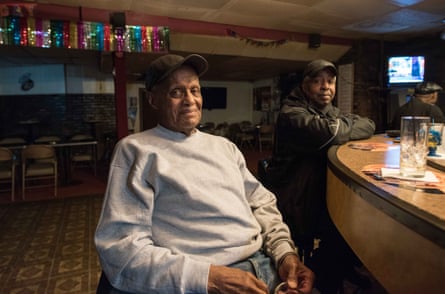
I find George Young, 88, drinking in the Chops Lounge with a group of longtime Gary residents – all of whom are vocally anti-Trump. George’s story is not uncommon in this town: at 21, he moved to Gary from Louisiana in 1951 “because of jobs. Simple as that. This town was filled with them. I left Louisiana on December 10th, got here the 11th, got a job at the Sheet and Tool company on the 12th, started working on the 13th, and spent the next 42 years and two months here.”
Although George doesn’t overlook Trump’s policies on race and immigration (“Is Trump a racist? Of course he is”), he also differs from many Trump voters in his assessment of the country’s problems.
“Trump can’t bring jobs back because the jobs are gone to automation. We used to have 10 men doing cleanup in my job. Now one man operates a machine. We used to have 10 men running the furnaces. Now robots run them.”
That view is a marked difference from what you hear from people in working-class white towns that voted for Trump, who are quick to assign blame to immigration and jobs moving overseas.
Perhaps the tendency of workers in Gary to blame automation reflects a hesitation against scapegoating immigrants, since many know all too well the ugliness that comes from racial politics. Or perhaps it comes from listening to Democratic politicians, who have long talked of how technology has changed work.
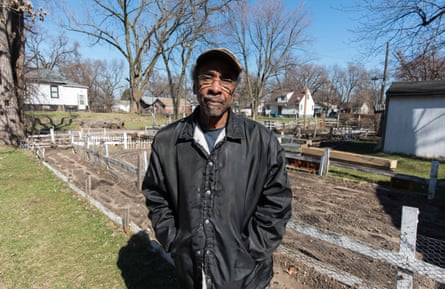
Alphonso Washington, 72, makes it clear he came to his views himself, not from politicians. “I don’t deal much in politics or listen to them much. I spent my life working, and then I retired.”
He points to a large vegetable garden next to his home, one of only a handful of empty plots on an otherwise filled block. “When the house next door burned down, I cleaned it up and made it into a garden.”
Alphonso was born in Gary, quit school in 11th grade, and walked straight into the steel mill. “Oh Lordy! Jobs was everywhere. I worked 34 years as a union crane man.”
Despite not following politics, he did vote for Clinton, because “I am a Democrat.” When I ask him about Trump’s promise to bring back factory jobs, he looks at me like I am crazy. “He ain’t going to bring the jobs back – the factories mostly run themselves now. They have robot cranes, so they don’t need crane men like me. It is because of that word. What is it? Automation?”
When I ask him about the few abandoned buildings that scar his block, he stops and thinks, and then says: “Gary just went down. Used to be a beautiful place, once in a time, then it just wasn’t.”
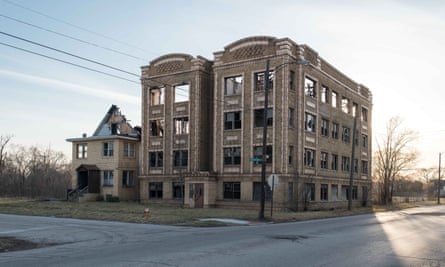
Not far away, Maria Garcia, 74, is more opinionated and blunt about the ugly changes in Gary. She lives on a block that looks as if her home alone survived a tornado untouched. It is only one of a few that isn’t boarded up, burned down, or covered by weeds and graffiti. Her yard has a garden and decorative flourishes, an individual act of resistance against the surrounding decay.
She moved to Gary in 1961 to live closer to her brother who worked in the steel mill. She got a job working for the city and later married a steel worker.
When I ask her about the changes in Gary, and on her block, she points to the broken homes: “This street used to be filled with good neighbors. Mostly whites. Some were Europeans from Spain, Poland, and Germany, and some from Puerto Rico like myself. Then in 1981, people started moving out. They started seeing black people coming in, and they said they would bring drugs and crime, so they left. I stayed because I don’t judge by color.”
I question her again to make sure I understand her correctly, and this time she is even more blunt: “Racism killed Gary. The whites left Gary, and the blacks couldn’t. Simple as that. Print that because it is true.”
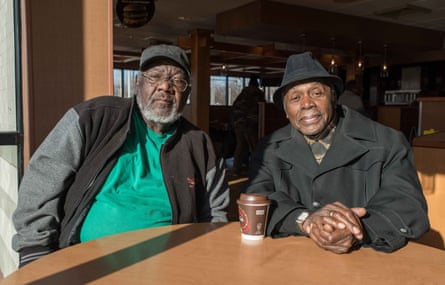
At the McDonald’s, Walter Bell, 78, agrees with Maria. He grew up in Gary and worked in the steel mill – “38 years, six weeks, and three days”, he says. “I don’t remember the exact seconds.”
He talks about how wonderful Gary once was, how it was a destination for everyone in the surrounding county, and how he walked right out of high school into a job in the steel mill (“I ended up an electrician, but started off as labor – hot jobs, dirty jobs, greasy jobs – we blacks had to start out with those”).
He pivots into a frustration about Gary now, about the emptiness, the factories closed, and the shops boarded up.
“Segregation did this to Gary. When the jobs left, the whites could move, and they did. But we blacks didn’t have a choice. They wouldn’t let us into their new neighborhoods with the good jobs, or if they let us, we sure as hell couldn’t afford it. Then to make it worse, when we looked at the nice houses they left behind, we couldn’t buy them because the banks wouldn’t lend us money.”
When I ask him about solutions to Gary’s problems, he shoots back: “It sure as hell isn’t Trump. He keeps saying he is going to bring jobs back. Sure, and I am gonna win the lottery. Those jobs are not coming back.”
Sitting next to Walter is a childhood friend, Ruben Roy, 85, who joins him daily for coffee and a chat. Ruben listens and nods yes, and then adds: “I started off working with a shovel and pick, shoveling and picking at things, but those jobs are gone. They got machines to shovel and pick now. The world has changed. Back in my day you needed a strong back and a weak mind to get a job. Now you need a weak back and a strong mind.”
As for those growing up in Gary now, “I would tell the kids to leave. Go get an education and go to where the jobs and opportunities are. They are not here in Gary any more. That is just the truth.”
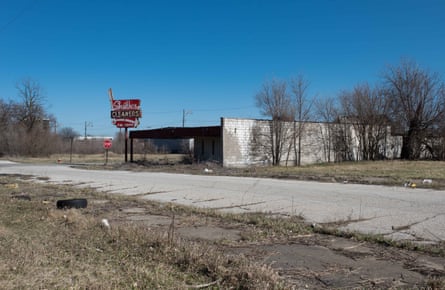
So much of our national dialogue is telling people living in towns like Gary to get the best education and then move. But that is hard in places like Gary, where educational opportunities can be far away or limited. Getting into one of the few elite schools is almost impossible.
Full-time dedication to an elite education is a luxury most don’t have. The more common and realistic educational path weaves through community colleges and smaller state schools, and is accompanied by additional challenges from family and financial obligations.
La Jazanay Turner, 20, works at Chuck E Cheese and attends Ivy Tech, the community college that serves Gary and the surrounding region. She was raised here by parents who were unable to finish a college education.
When I ask her about her community college experience, she explains it is a stepping stone: “I wasn’t very good at school, so I am going here to get back into it and then go to a bigger college.”
When I ask her about leaving Gary, she is conflicted. “This is my hometown, I love it, I just wish it was better. I wish people would stop killing each other. I know I might have to leave to get a better job, but if getting a better job means losing yourself, then it is not what I want to do. Family is too important to me.”
Moving is also far easier said than done. For some, it means having to give up on a place and family that is all you know and all that values you. In Gary, the conflict between wanting and needing to stay, and understanding you might have to leave, is especially strong.
Walking around Gary – seeing one crumbled home after another –it is hard to imagine anyone would want to stay here. But some have little choice, confined by a lack of opportunity, unequal access to education, and racism. More importantly, many have made the best of their situations and turned the city into their home, despite its outward problems.
![Imani Powell: ‘It scares me to walk by [abandoned buildings]; I don’t want to end up a body lost in one of them.’](https://i.guim.co.uk/img/media/95626c38e755313b2f1c41964c745531663506f5/0_497_7360_4415/master/7360.jpg?width=445&dpr=1&s=none)
Imani Powell, 23, sits in the McDonald’s reading on her day off from the Buffalo Wild Wings. She briefly left Gary to attend college in Arizona but came back to be with her mother. When I ask her why she returned, she responds, “My mother and sister and I are close. I missed them. We have been through a lot together.”
Me: “What about your dad?”
Imani: “My dad is not in my life. We don’t pay much attention to him. He is in and out of jail.”
I ask her if she is going to try and leave again.
“I really would like to move someplace more beautiful, where you don’t have to worry about abandoned buildings. There are just so many here. It scares me to walk by them; I don’t want to end up a body lost in one of them. It is complicated for people who live in Gary. They don’t want to move because this is what they are used to. Do you want to go and do your own thing, or be with your family? They say places are what you make of them, but is hard to make something beautiful when it is shit.”
![Maria Garcia: ‘In 1981 people started moving out [when] they started seeing black people coming in ... I stayed because I don’t judge by color.’](https://i.guim.co.uk/img/media/6c9a2b0de56e3ee7f76cf32c991eb24b0bba16e4/0_0_6889_4133/master/6889.jpg?width=465&dpr=1&s=none)
Comments (…)
Sign in or create your Guardian account to join the discussion